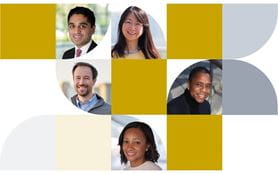Alumni profile: Tyler Kinder talks about the importance of diversity in law
Headlines in this article
Related news and insights
Publications: 11 December 2023
Publications: 11 December 2023
Publications: 11 December 2023
Publications: 11 December 2023
Responsible AI: navigating the risks and embracing the possibilities
Alumnus Tyler Kinder thought he might like a career in law but decided to take a good look first at his alternatives. He’s glad he stuck with his original instinct.

Diversity comes in many dimensions. It’s the ones you don’t notice – that are so blindly obvious they no longer register – that can make the most impact.
When Tyler Kinder, a former International Capital Markets (ICM) associate in the New York office, was considering his options for a training contract, he was drawn to A&O by its international reputation. The work, the people, the culture – all were “strong selling points for me”, he said.
He also liked the idea of working in a good-sized office of a much larger global institution – “an office that was small enough that everyone knew each other” but big enough to play its part on the larger stage.
He wasn’t disappointed. As part of the Derivatives and Structured Finance team in the ICM department, he quickly found himself working with people “from all over the network; all over the world”. Communicating across time zones and geographies with colleagues of widely varying backgrounds, influences and orientations was a fact of life.
That geographic and cultural diversity was invigorating. In his view, “creating opportunities for different kinds of people to work together” is key to sustaining diversity in the work environment, and it paid “huge dividends to A&O”.
Moving across the continent
Tyler is blessed with a good sense of curiosity and adventure. Originally from Washington State on the U.S. West Coast, he moved across the continent to New York for college and, except for three years in the UK, a six-month stint in Beijing, and a year in Washington, D.C., hasn’t left.
A career in law was always in the back of his mind, but he took a circuitous route to get there. “I always thought I might like being a lawyer,” he said. The qualities that make a good lawyer seemed to match what he considered his strengths. He never saw himself as a litigator. “That’s not me,” he said. Instead, he was drawn to the transactional side of law, focusing on language and detail, helping clients navigate through documents and processes.
But he was wary of going straight into it because law school is “expensive and a big-time commitment”. So he decided “to do a few things first”, starting with a post-graduate year working for the Brookings Institution think tank in Washington, D.C.
He then headed to England, to study for an MPhil at Oxford, thinking that if there was another direction, he wanted to explore it. His three years in the UK were life-changing in more ways than one: as well as obtaining a degree in Modern Chinese Studies, he gained a partner – his husband, Peter, who is a book editor.
“It’s nice to be with someone who’s not a lawyer,” Tyler said. “It provides a window on another world and I benefit from that.”
Ultimately, he felt his career instinct had been right and enrolled in the New York University School of Law, graduating with a JD in 2013 and qualifying in 2014.
It was incredibly valuable, as a young lawyer, to have as role models members of the LGBTQ+ community working as partners in a prestigious law firm.
Work from every practice group
Tyler had his first glimpse of A&O when he worked as a summer associate in the New York office in 2012. He liked what he saw: “The great thing about the summer programme is that summer associates are invited to take work from every practice group.
“I was given an opportunity as a summer associate to take pieces of client-facing work and live deals in ICM. In retrospect, it wasn’t particularly glamorous work but it made an impression on me to be handed real responsibility at such an early stage in my career. I really liked that.”
Joining A&O full-time, he did a rotation in project finance before settling on ICM. The Derivatives and Structured Finance team was “where I fit best”, he said.
As a gay man, Tyler has been pleasantly surprised at how welcoming the worlds of law and finance are. He considers himself lucky to have always worked for “open and supportive institutions” such as A&O. He said: “One of the great things about my time at A&O was having several LGBTQ+ partners as mentors and supervisors. It was incredibly valuable, as a young lawyer, to have as role models members of the LGBTQ+ community working as partners in a prestigious law firm.
“That type of visibility and representation at the partner level is very important, not just to LGBTQ+ people but for other young lawyers from marginalised backgrounds.” He’s also aware that as a white male, he’s been privileged… it’s important to keep in mind that others from marginalised communities will see fewer leaders who look like them as we think about the work still to be done.”
It’s “amazing and heartening”, Tyler said, how much has changed in recent years in the perception of the key qualities of a good leader. “Even since I graduated, the importance – or lack of importance – of sexual orientation in terms of who is seen as qualified for a leadership role has changed dramatically.
“Obviously it’s complicated, because much will depend on the organisation and various other factors, such as race, ethnicity, class, gender, gender expression – you name it. All these things interact in different ways in different places.”
Hiring, promoting and retaining LGBTQ+ talent is “incredibly important”. It also “meant a lot” to Tyler and other gay colleagues that the Pride drinks reception hosted by A&O’s ICM department every summer attracted a strong cross-section of people from across the office.

Public service and government
He left A&O as an associate after almost four years when an opportunity arose at the Port Authority of New York and New Jersey, a bi-state governmental organisation that oversees much of the regional transportation infrastructure. Joining as an attorney in the Transactions Group ticked a personal box for Tyler: public service and government had been on his radar “from Day 1 of law school”.
The Port Authority is hugely important for the New York area, with responsibility for many matters that are critical to the regional economy. Tyler’s role was “incredibly broad”: from working on small transactions such as leases and permits to massive projects designed to redevelop the infrastructure of New York City.
The intergovernmental and legislative work was new to him, but in retrospect what he appreciated most in that job was the “clear connection” of his work to the physical world. “I could look out the office window at the World Trade Center and see steel being put in place as a result of a contract I’d worked on,” he said. “That was a very rewarding aspect of the job.”
In 2019, he moved to Citi to take up an opportunity to go “back to the realm of work I did at A&O”; much of what he does now is creative thinking with business colleagues grappling with the complexities of derivatives, structured products and loans, helping them to understand how new regulations, for example, might affect transactions they’re interested in.
“A lot of transactional areas are undergoing rapid transformation due to new technology,” he said. “I also work on the legal aspects of a number of interesting initiatives related to the growing importance of technology in trading.”
Working in-house has been a new experience. “Much of what I work on never ‘leaves the house’ because we’re working hand in glove with the business in thinking about different ideas that they have, things that they think might have client potential.”
Thinking through different regulatory questions “was something I enjoyed at A&O,” Tyler said. His time there provided an important foundation. “At Citi, it’s busy, varied and interesting work, with great people – including some old colleagues at A&O.”
I could look out the office window at the World Trade Center and see steel being put in place as a result of a contract I’d worked on.
‘Allies’ in the broader community
Tyler remains a member of A&Out, A&O’s LGBTQ+ network. One of its strengths, he said, has always been its reach to ‘allies’ in the broader community. “I think such groups are important for increasing a sense of belonging and inclusivity for employees, even those who aren’t actively engaged,” he said. It is also an important sign of an organisation’s commitment to inclusivity, representation and visibility.
“A&Out has organised some great events in New York. In 2019, my husband and I attended an event at the Museum of the City of New York, a photographic exhibition celebrating the 50th anniversary of the Stonewall uprising. It was wonderful to learn more about an important period in LGBTQ+ history while catching up with old colleagues.”
When the Covid-19 lockdown came to New York City in mid-March, Tyler and Peter moved to the Connecticut town of Salisbury. In mid-August, after five months of isolation, Tyler was looking forward to getting back to New York City. Not that they didn’t enjoy the change in scenery and a summer in the country but, in his view, there’s “real value in being in the same place with colleagues” and the face-to-face conversations that enables.
Generally, he said, people had been “amazed at how well the transformation has gone”. Scattering a team used to working as a close unit “has presented challenges,” but he had found everyone prepared to make the extra effort to stay connected, to “find ways of replicating the important idea-sharing and check-ins that happen naturally when we’re on the same floor”.
From his perspective, the lockdown highlighted the benefits of flexibility in the workplace, the “huge amount” of time it created simply by eliminating the daily commute to the office, which in Tyler’s case is about 45 minutes each way from his home in the borough of Queens. “You can reprogramme that time for your own use or for work, depending on the day,” he said. “Having that additional flexibility is a plus.”
Indeed, a better understanding of flexible working may be an important legacy of the 2020 pandemic lockdown, he said. Where remote working has worked for organisations and their employees, the upshot may be “geographical diversity” – a more widely dispersed workforce whose choice of where to live is less constrained by a physical workplace location.
Tyler Kinder
Senior Vice President and Assistant General Counsel, Citi, 2019 - present
A&O: 2013 - 2017

Download the yearbook
Read our full Alumni Yearbook 2020
Download PDF


